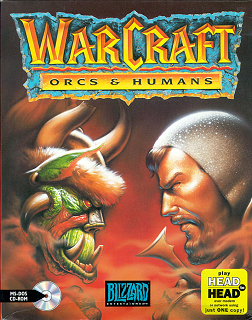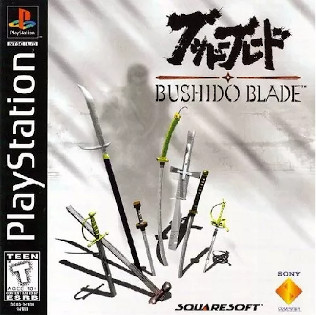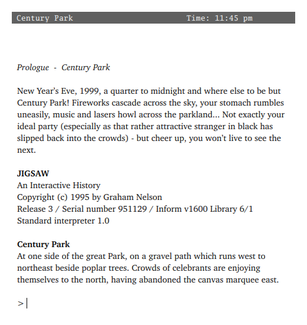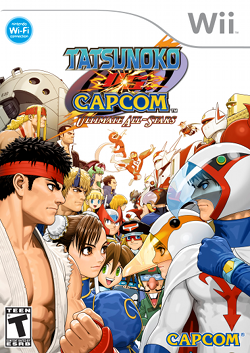Interactive fiction (IF) is software simulating environments in which players use text commands to control characters and influence the environment. Works in this form can be understood as literary narratives, either in the form of Interactive narratives or Interactive narrations. These works can also be understood as a form of video game, either in the form of an adventure game or role-playing game. In common usage, the term refers to text adventures, a type of adventure game where the entire interface can be "text-only", however, graphical text adventure games, where the text is accompanied by graphics still fall under the text adventure category if the main way to interact with the game is by typing text. Some users of the term distinguish between interactive fiction, known as "Puzzle-free", that focuses on narrative, and "text adventures" that focus on puzzles.
The Interactive Fiction Competition is one of several annual competitions for works of interactive fiction. It has been held since 1995. It is intended for fairly short games, as judges are only allowed to spend two hours playing a game before deciding how many points to award it, but longer games are allowed entry. The competition has been described as the "Super Bowl" of interactive fiction.

Warcraft: Orcs & Humans is a real-time strategy game (RTS) developed and published by Blizzard Entertainment, and published by Interplay Productions in Europe. It was released for MS-DOS in North America on 15 November 1994, and for Mac OS in early 1996. The MS-DOS version was re-released by Sold-Out Software in 2002.
Adam Cadre is an American writer active in a number of forms—novels, screenplays, webcomics, essays—but best known for his work in interactive fiction.

Photopia is a piece of literature by Adam Cadre rendered in the form of interactive fiction, and written in Inform. It has received both praise and criticism for its heavy focus on fiction rather than on interactivity. It won first place in the 1998 Interactive Fiction Competition. Photopia has few puzzles and a linear structure, allowing the player no way to alter the eventual conclusion but maintaining the illusion of non-linearity.

Drizzt Do'Urden is a fictional character appearing in the Forgotten Realms campaign setting for the Dungeons & Dragons fantasy role-playing game. Drizzt was created by author R. A. Salvatore as a supporting character in the Icewind Dale Trilogy. Salvatore created him on a whim when his publisher needed him to replace one of the characters in an early version of the first book, The Crystal Shard. Drizzt has since become a popular heroic character of the Forgotten Realms setting, and has been featured as the main character of a long series of books, starting chronologically with The Dark Elf Trilogy. As an atypical drow, Drizzt has forsaken both the evil ways of his people and their home in the Underdark, in the drow city of Menzoberranzan.

Galatea is an interactive fiction video game by Emily Short featuring a modern rendition of the Greek myth of Galatea, the sculpture of a woman that gained life. It took "Best of Show" in the 2000 IF Art Show and won a XYZZY Award for Best Non-Player Character. The game displays an unusually rich approach to non-player character dialogue and diverts from the typical puzzle-solving in interactive fiction: gameplay consists entirely of interacting with a single character in a single room.
The XYZZY Awards are the annual awards given to works of interactive fiction, serving a similar role to the Academy Awards for film. The awards were inaugurated in 1997 by Eileen Mullin, the editor of XYZZYnews. Any game released during the year prior to the award ceremony is eligible for nomination to receive an award. The decision process takes place in two stages: members of the interactive fiction community nominate works within specific categories and sufficiently supported nominations become finalists within those categories. Community members then vote among the finalists, and the game receiving a plurality of votes is given the award in an online ceremony.

Bushido Blade is a 3D fighting video game developed by Lightweight and published by Square and Sony Computer Entertainment for the PlayStation in 1997. The game features one-on-one armed combat. Its name refers to the Japanese warrior code of honor bushidō.

Slouching Towards Bedlam is an interactive fiction game that won the first place in the 2003 Interactive Fiction Competition. It is a collaboration between American authors Daniel Ravipinto and Star Foster. Slouching Towards Bedlam was finalist for eight 2003 XYZZY Awards, winning four: Best Game, Setting, Story, and Individual NPC. The game takes place in a steampunk Victorian era setting. Its title is inspired by a line from "The Second Coming", a poem by W. B. Yeats.

FreeSpace 2 is a 1999 space combat simulation computer game developed by Volition as the sequel to Descent: FreeSpace – The Great War. It was completed ahead of schedule in less than a year, and released to very positive reviews, but the game became a commercial failure, and was described by certain critics as one of 1999's most unfairly overlooked titles.
Jon Ingold is a British author of interactive fiction and co-founder of inkle, where he co-directed and co-wrote 80 Days, and wrote Heaven's Vault and Overboard!. His interactive fiction has frequently been nominated for XYZZY Awards and has won on multiple occasions, including Best Game, Best Story and Best Setting awards for All Roads in 2001. Ingold's works are notable for their attention to the levels of knowledge that the player and player character have of the in-game situation, with the effect often depending on a player who understands more than the character or vice versa. Ingold has also written a number of plays, short stories and novels.

In the Dungeons & Dragons role-playing game, orcs are a primitive race of savage, bestial, barbaric humanoid.

Jigsaw is an interactive fiction (IF) game, written by Graham Nelson in 1995.

Floatpoint is a 2006 work of interactive fiction written by Emily Short about a diplomat sent to an endangered colony to discuss evacuation options and terms of cohabitation. It is written in Inform 7 and won the 2006 annual Interactive Fiction Competition. Floatpoint also won 2006 XYZZY Awards for Best Settings and Best NPCs. The game was generally praised for its use of multiple endings.

Soulcalibur IV is a 2008 fighting video game developed by Project Soul and published by Namco Bandai Games for the PlayStation 3 and Xbox 360. As the fifth main entry in the Soulcalibur series, it marks a significant evolution in gameplay with enhanced graphics and new features compared to its predecessor Soulcalibur III (2005), including the introduction of three guest characters from the Star Wars franchise: Darth Vader, Yoda, and the Apprentice.

Tatsunoko vs. Capcom: Ultimate All-Stars is a crossover fighting game developed by Eighting and published by Capcom. The game features characters from both Capcom's video game franchises and various anime series produced by Tatsunoko Production. It was originally released in Japan for arcades and the Wii video game console in December 2008 as Tatsunoko vs. Capcom: Cross Generation of Heroes. Following high demand from international fans, Capcom worked with Tatsunoko to resolve international licensing issues and a second version, Ultimate All-Stars, was released for the Wii in North America, Japan, and Europe in January 2010, featuring additional characters and online multiplayer.

DJ Hero is a 2009 rhythm game developed by FreeStyleGames and published by Activision. It is the first spin-off of the Guitar Hero series. It was released on October 27, 2009, in North America and on October 29, 2009, in Europe. The game is based on turntablism, the act of creating a new musical work from one or more previously recorded songs using record players and sound effect generators, and features 94 remixes of two different songs across numerous genres.

Violet is a work of interactive fiction by American author Jeremy Freese. It is a one-room puzzle game.

9:05 is an interactive fiction game developed by Adam Cadre in 2000. The story follows a man who wakes up and gets a call telling him to go to work, and it follows branching paths. The game is commonly used as a gateway to text adventure games because of its short length and overall simplicity and is used by English as a second language (ESL) teachers to help students attain mastery of English.















